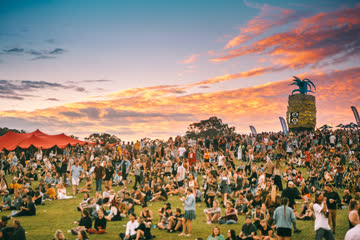Latecomers
“I don’t think I realised quite what would be released, emotionally, when the album was released.”
"When I listen to music that I love, that really gets to me, all I know is that it pulls me closer to life, to my own life,” says Jaye Kranz, the leader of hushed Melburnian duo Brighter Later, speaking philosophically on the act of music-making. “It makes me want to feel more, or go deeper into something in my life. That's what, deep down, even just subconsciously, you aim for as a musician. It's very non-specific, and it's never about just one song, you just want to create that feeling, and hope to inspire that in just one someone.”
Kranz is feeling philosophical with the release of her debut album, The Wolves. Slyly taking their name from that crown prince of all that's quiet and fragile, Nick Drake (and his 1970 LP Bryter Layter), Brighter Later make composed music based around Kranz's aching voice and lyrical storytelling. Recorded in a converted church in Yarraville, the LP marks Kranz's first-ever full-length; a debut arriving not in a mad rush of youth, but in her 30s.
Kranz felt her first writerly flurries as a kid attending a “hippy school” in Melbourne. “It was the kind of school where kids rang their own bell when they thought lunchtime was over,” she recounts. “You could go and sit under a pine tree and write poetry, which is the sort of thing I did.”
At 18, as “an idealistic young socialist” Kranz travelled to Israel, on a trip that was “all one big party, really”, and found her pursuing her muse further. “I was working as a volunteer in a plastics factory on a kibbutz in the Middle East,” she explains. “I don't know if it was the fumes from the plastic, but, even though I didn't have an instrument, I wrote lots of songs in my head, and they were pretty out there, pretty obscure and convoluted.”
Don't miss a beat with our FREE daily newsletter
After that, Kranz would spend years wandering; and it was when living in New York, on a grant to pursue fiction-writing, that she would suddenly be struck by the urge to shelve what she was doing. So, she picked up, stayed at a boyfriend's empty house in New Orleans, and threw herself into writing tunes. Eventually, she'd return home, and have to work out what to do with this change of artistic tack.
“I was away from Melbourne for nearly ten years, and when I came back I just had all those songs that I didn't really know what to do with,” Kranz says. “This friend of mine, Virginia Bott, we hooked up together, and I started playing my songs. And from playing live, we sort of got a sound.”
Though Brighter Later had “sort of” a sound, Kranz wasn't entirely sure what that was; with its hints of country, folk, and even slowcore, her band wasn't operating in an assumed style. “It was quite confronting to go 'I don't know what the genre is, even',” she offers. “I had no idea; I didn't know what kind of music this was, where it fit into the world. I just had to stay the course with the feeling I had, and hope that it would eventually lead us to a place where it all made sense.”
That place has become, essentially, The Wolves; a set of songs about “redemption, though not in a religious sense” and this elusive, hard-to-articulate idea that “you can always still celebrate the beauty of something, even if it's gone”. The LP marks the end of a long journey for Kranz, both literally and spiritually; which has her thinking about music not just philosophically, but emotionally. “We didn't do EPs or singles or anything, so it's been a really long process building up to this,” she says. “I don't think I realised quite what would be released, emotionally, when the album was released.”
The Wolves is out now.








